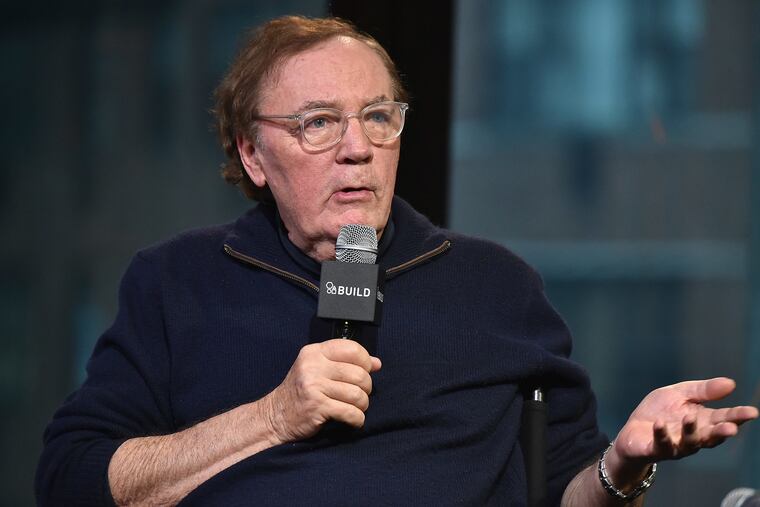James Patterson is big-mad. He’s also dead wrong.
There is no “racism” against white men in publishing. There’s just an industry that once again has to evolve to meet its new era. So can he evolve, too?

I develop diversity, equity, and inclusion strategies for one of the biggest book publishers in the world, and I teach creative writing and publishing courses at area colleges, so I know why James Patterson is big-mad.
I found out about his comments Monday, on a group chat with my diversity, equity, and inclusion colleagues. We routinely share articles that help us recontextualize and embolden our work, and at some point, someone posted the article in the Sunday Times in which Patterson laments that white men are having trouble getting hired as writers, calling it “racism.”
Let’s just say that Patterson’s comments did not help us recontextualize or embolden our work. Because he’s flat-out wrong.
“Doofus” was all one colleague could muster. And really, what more is there to say about a white man who is reckoning with the end of his time. Gone are the days when white men are prioritized only because of their identity rather than, let’s say, actual talent and intellect. That must be painful.
When Donald Trump says, “Make America Great Again,” and when James Patterson says, white men face “another form of racism,” please understand that these white men are saying the same thing. Trump and Patterson were born a year apart and grew up during America’s Golden Era. After galvanizing all its resources toward the war effort, America was able to redirect those post-war resources to meet growing consumer demand for goods and real estate, employing millions of Americans and boosting the middle class.
However, while there were many more jobs available during this period, they weren’t available to all. Only 2% of women and Black men worked in highly skilled jobs that pay better (like engineering), whereas 94% of doctors were white men. Generations of Trumps and Pattersons enjoyed unfettered access to the spoils of being born cis-het and white, while discrimination, unequal education, social norms, and bad laws tripped Black and brown people as they tried to sprint ahead.
Book publishing, as we now know, has been an allegory for the rest of America. During the Golden Era, book publishing faced pressure to create new content as literacy rates climbed and more people went to college. Publishing was forced to expand and corporatize its operations, thus the literary star was born. Publishers realized they couldn’t possibly put an equal amount of effort behind each individual book, so they chose a select few to pour resources, ensuring the success of writers like Tennessee Williams, Truman Capote, Henry Miller, and Jack Kerouac. (There were famous Black writers of this era — James Baldwin, of course — but they were always exceptions. Toni Morrison famously championed Black writers when she worked at Random House starting in the 1960s, but after leaving her post, the publisher went back to its old ways.)
Half a century later and the world has dramatically changed: The internet, cell phones, and social media created an interconnected society where one can quickly and easily expose injustices, from #BlackLivesMatter to #PublishingPaidMe. A Black man and Black woman ascended to the offices of president and vice president, respectively.
So yes, the country is changing, and publishing will continue to add more diverse authors and perspectives to reflect our new society. I am sure that for the Trumps and Pattersons of the world, who have only ever enjoyed their privilege, this change feels unbearable.
But things haven’t changed that much. A diversity audit by Random House (now Penguin Random House) found that three-quarters of authors from 2019 to 2021 were white, and only 6% were Black. A 2020 analysis by the New York Times of English language fiction from 2018 showed that 89% of authors were white, even though white people made up only 60% of the population.
And #PublishingPaidMe, in which authors revealed the advances they received on their books, showed that Black authors still often get paid significantly less than their white peers.
James Patterson is wrong. There is no “racism” against white men in publishing. There’s just an industry that once again has to evolve to meet its new era. The Pattersons of the world will get to witness brilliant and qualified Black men and women create new opportunities of power and advancement for the very populations that have historically been enslaved, humiliated, dehumanized, ignored, raped, plundered, and murdered.
So James Patterson, and white men like him, get to decide: Are you going to evolve to meet our new era?
Because we know what happens to people who refuse to evolve. They become obsolete.
Susette Brooks is an award-winning writer, educator, and communications strategist. She develops diversity, equity, and inclusion strategies for a book publisher and leads a team of soldier-journalists in the New Jersey Army National Guard. She is a former board member for Philadelphia Stories.